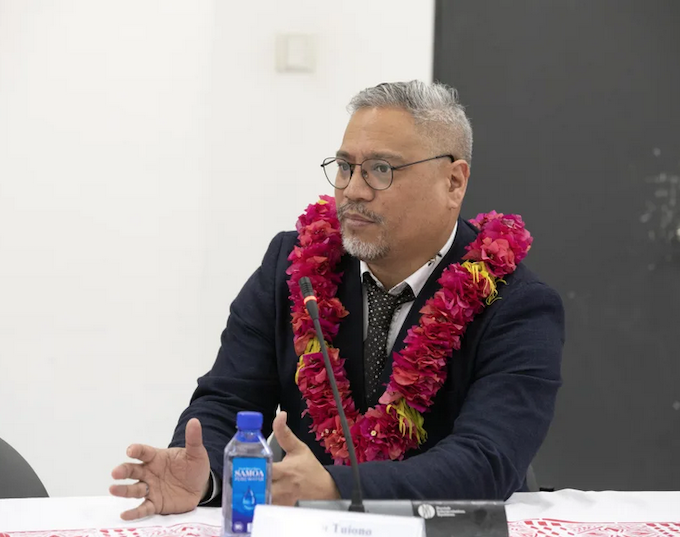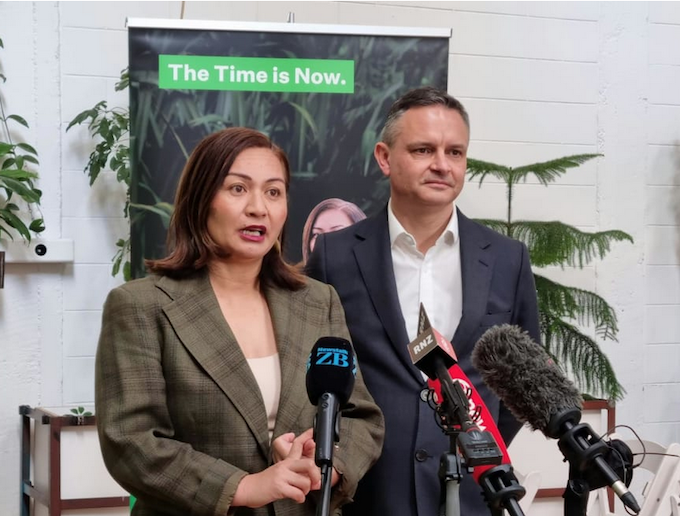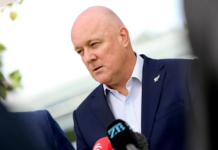
As New Zealand’s former climate change minister James Shaw prepares to step down from the Green Party’s co-leadership role, the space has opened for a new contender.
Speaking after today’s announcement, co-leader Marama Davidson refused to guarantee she too would not step down before the election but said she would stay on for at least the next 12 months.
Numbering 15 MPs, the team is its largest ever but also largely inexperienced. Among the mix in the co-leadership possibilities is the party’s first MP with a Pasifika whakapapa — Teanau Tuiono.
- READ MORE: James Shaw resigns as Green Party co-leader
- Tributes for ‘decent, insightful’ minister as James Shaw resigns
Shaw announced earlier today he would be stepping down as Green Party co-leader in March.
“It has been the privilege of my lifetime to serve as New Zealand’s Climate Change Minister for the last six years and as Green Party co-leader for nearly nine,” Shaw said in a statement.
“I’m very proud of what the Green Party has achieved over the last eight years.”
He said he would remain in Parliament to support his Members Bill, which would insert a new clause into the Bill of Rights Act stating that everyone has a right to a clean, healthy and sustainable environment.
The bill was introduced to Parliament in December and is yet to have its first reading.
He said the Greens had become party of government, with ministers, for the first time and had made political history by increasing its support at the end of each of our two terms — “a feat no other government support partner had achieved”.
Following Shaw’s exit from Parliament, two-thirds will be fresh-faced first-timers and just Davidson and Julie Anne Genter will have any experience of sitting in opposition.
So who are some potential contenders for the leadership?

Chlöe Swarbrick (Auckland Central MP):
Ranked third on the party list, the Auckland Central MP appears to be the popular choice.
After losing the mayoral race in 2016, she joined the Green Party.
Winning the Auckland Central seat in 2020 and becoming the country’s youngest MP in 42 years, she has proven her popularity from early on.
She is the first Green MP ever to hold on to a seat for more than one term after winning again in the 2023 elections.
Swarbrick denied leadership ambitions in 2022, when more than 25 percent of delegates at the party’s annual general meeting voted to reopen Shaw’s position.
Still, she commands the highest profile of all Green MPs, regularly registering in preferred prime minister polls ahead of the party’s co-leaders.
Recently, she had to apologise to Parliament a week after saying in the debating chamber Prime Minister Christopher Luxon had lied — a breach of the rules.
If selected for the co-leadership, the 29-year-old would also become the youngest to co-lead the party.
Teanau Tuiono (List MP):
Teanau Tuiono (Ngāpuhi and Ngāi Takoto) moved to the fifth ranking on the party’s list after Jan Logie and Eugenie Sage retired in the 2023 elections.
As the party’s candidate Palmerston North, he became a list Member of Parliament — the party’s first MP with Pasifika whakapapa – in the 2020 general elections. And again was re-elected as a list MP in 2023.
He spoke of how he believed swearing allegiance to the Queen was outdated, and said that it should be to Te Tiriti o Waitangi instead.
In 2022, as Shaw battled to keep his co-leadership role, Tuiono publicly contemplated contesting.
Last year, his Restoring Citizenship Removed By Citizenship (Western Samoa) Act 1982 Bill was introduced in Parliament. The bill would restore the right to New Zealand citizenship for people from Western Samoa who were born between 1924 and 1949 — a right promised to them and found owed them by New Zealand’s then highest court.
In December, Tuiono was appointed as the third assistant speaker — the first Green Party MP to become a member on the speaker team.
He recently expressed concern over the lack of Pasifika voices in the government.
Julie Anne Genter (Rongotai MP):
The MP for Rongotai currently stands in the fourth rank on the list. Since 2011, she has been elected to each Parliament while on the party’s list.
In 2017, Genter put her name forward for the Mount Albert byelection, but she came in second after Jacinda Ardern.
Genter served as the minister for women, associate minister for health and associate minister for transport from 2017 to 2020.
The Ombudsman twice investigated a letter she sent to then Transport Minister Phil Twyford during pre-consultation on the Let’s Get Wellington Moving indicative package draft Cabinet paper.
National had accused her of convincing Twyford to push back construction of a second Mount Victoria tunnel for at least a decade.
After the next transport minister released the letter in full, Genter said she stood by her comments and that the contents clearly reflected the Green party’s position.
Much like Swarbrick, Genter was not interested in contesting for the party’s leadership in 2022.
Rules and voting
Nominations will open on 31 January and close on 14 February.
Members will attend local meetings and vote, with a new co-leader to be announced on March 10.
Each branch is entitled to a certain number of votes proportionate to the number of members who live in that electorate.
The party’s rules were changed in 2022, removing the requirement for a male co-leader. Instead, members voted to mandate one female leader and one leader of any gender. One leader must also be Māori.
As Davidson meets both the female and Māori criteria, the vacancy can be filled by any Green member, in or out of Parliament.
This article is republished under a community partnership agreement with RNZ.














































